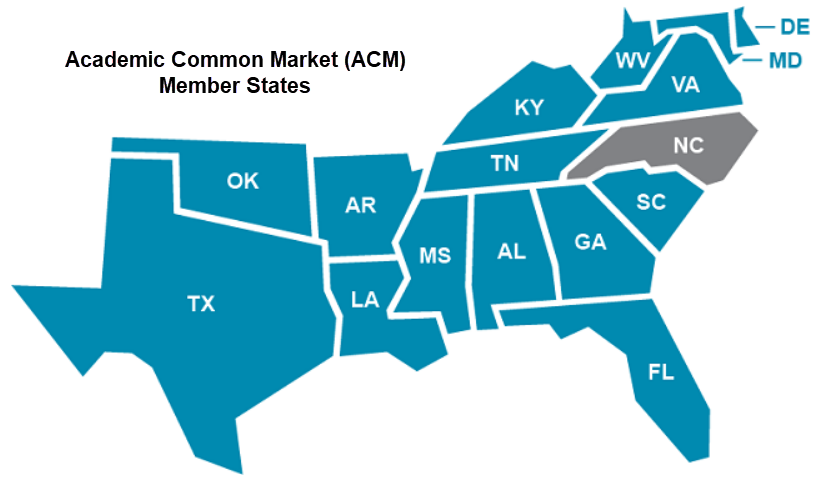The Academic Common Market (ACM) is an arrangement among
Southern states allowing students to pay in-state tuition rates at
a non-Oklahoma college or university while studying approved degree
programs not available at Oklahoma public institutions. The tuition
savings to Oklahoma residents who participate in ACM programs, as
compared to those who enroll as out-of-state students, vary by
institution.
 The Academic
Common Market
The Academic
Common Market is administered by the Southern Regional
Education Board (SREB). Eligible degree programs are those that
differ in curricular content by at least 51 percent from degree
programs offered in Oklahoma. A searchable list
is administered by the Southern Regional
Education Board (SREB). Eligible degree programs are those that
differ in curricular content by at least 51 percent from degree
programs offered in Oklahoma. A searchable list of eligible programs is maintained by the
SREB.
of eligible programs is maintained by the
SREB.
Application
Contact the college or university you wish to attend for
information concerning admission into the degree program you wish
to pursue to determine if it is approved for participation in the
ACM. Once you have been unconditionally accepted into the program,
complete the online ACM Application and Residency Form. A copy of your letter of unconditional
acceptance/admission into the program along with proof of residency
will need to be uploaded with the application.
Once it is determined that you are an Oklahoma resident, a
letter of certification will be emailed to you and a copy provided
to the appropriate official at the institution. This certification
will qualify you for in-state tuition and fees.
If there is interest in a program that is not on the current
list of available programs, a request may be made to have the
program reviewed for possible inclusion. To make this request,
complete the online ACM Application and Residency Form. A copy of
your letter of unconditional acceptance/admission into the program,
proof of residency and curricular information about the program,
including course descriptions and credit hour requirements will
need to be uploaded with the application. ACM guidelines stipulate
that only those programs that differ in curricular content by at
least 51 percent from programs offered at Oklahoma public
institutions may be included. Since the number of programs offered
through the ACM is frequently updated, visit the ACM searchable list for the most recent list of accessible programs.
for the most recent list of accessible programs.
For Further Information
Jenny Wood
Academic Common Market Coordinator
Oklahoma State Regents for Higher Education
jwood@osrhe.edu
405.225.9266
Frequently Asked Questions
Q. What is the purpose of Oklahoma's
participation in the Academic Common Market and what are the
advantages?
A. Residents of 15 Southern Regional Education Board
(SREB) states may participate in the Academic Common Market (ACM),
an agreement that enables students to pursue unique academic majors
offered at public institutions in the other SREB states at in-state
tuition rates. Oklahoma students and parents participating in such
programs realize significant savings because in-state tuition rates
are generally substantially lower than out-of-state rates. Oklahoma
taxpayers also save because the ACM provides access to costly,
unique baccalaureate and graduate programs that otherwise would
have to be duplicated in our own state.
- Residency Status - An individual must
demonstrate residence in Oklahoma.
- Admissions - Students must be
accepted into a program of study not offered at an Oklahoma public
college or university and listed in the ACM inventory for Oklahoma
residents. Students who still have outstanding "provisions" or
conditions to fulfill their admissions requirements must complete
their obligations and provide evidence of full admission before
applying for ACM.
- Application - Applicants must
complete the online ACM Application and Residency Form for the
Academic Common Market.
- Deadline - Institutions set their own
policy regarding any deadline for the payment of tuition. ACM
students not accepted or certified within the deadline for payment
may have to wait until the next tuition payment period to receive
the out-of-state fee waiver or in-state status.
Q. Can I receive Academic Common Market certification if
my acceptance to a university is provisional?
A. No. In order to receive certification, your acceptance
must be unconditional. You cannot receive certification if your
acceptance is provisional, probational, or is contingent upon test
scores, transcripts or other factors.
The Coordinator then notifies the applicant and the institution
of the student's eligibility. The institution will either grant a
tuition waiver equal to the difference between in-state and
out-of-state tuition or simply classify the student as an in-state
resident.